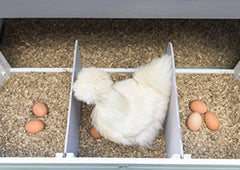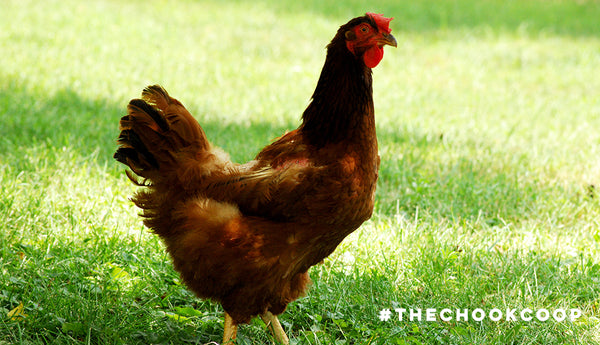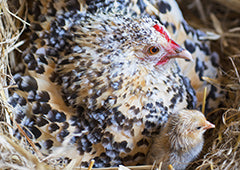There’s nothing better than fresh eggs straight from the backyard flock every morning. So it may come as a surprise that after having a Summer and Autumn of plentiful produce, that the number of eggs your ladies supply have dwindled - and perhaps have even stopped altogether! What’s going on? Is your flock sick? Have your hens decided that they can’t be bothered laying again? The answer is none of the above.
Like most life cycles, the chicken egg-laying process is affected by natures fluctuations. Every new month we can see how the colder temperatures affect our environment - from ice freezing, to leaves falling off trees, to the days growing shorter.
It is because the environment changes quite drastically that the chickens egg-production cycle also alters. Here are some of the reasons why, in winter, the chickens need a bit of a break from all their egg-cellent work.
1. The light decreases
The chickens egg-laying process is greatly affected by the amount of light they’re exposed to. Their bodies are extremely sensitive to any changes, and decreasing amounts of light actually indicate to a hen that the temperature is going to drop.
Why is this a problem? Well essentially, hens produce eggs for the purpose of hatching them. When the light decreases, and a temperature drop is indicated, the hens maternal instinct kicks in and tells them that the conditions aren’t going to be warm enough for their babies to survive. Hence, their body tells them to stop producing eggs. Fascinating isn’t it!
People who just can’t live without their eggs sometimes pop a light into their flocks coop, which simulates extra hours of daylight and will have your hens laying like its summertime. Just having it on for a couple of extra hours in the evening is enough to simulate the hours of sunlight common in the warmer months.
However, if you aren’t too fussed about eggs and just love to have your chickens regardless of their egg-laying capabilities, then it’s probably best to just let nature take its course, and give them a break from their hard work.
2. Moulting
Moulting occurs when the chickens shed their old feathers and sprout shiny new ones in their place. When moulting does occur, egg production cannot - as the hen needs all her egg-stra energy to be devoted to growing a strong new coat.
Often times, moulting will occur after egg-production has stopped due to the shortening hours of daylight, so the period of non-laying is slightly extended. But there is definitely an upside to this period of ceased laying - when production kicks off again, these eggs are tastier and fresher than ever!
If your chickens are moulting in winter, then they cannot lay eggs until they have completed the process, so don’t try and encourage the behaviour with artificial influences. A good way to ensure the eggs you do get post-moult are delicious and have strong shells is to increase the calcium and protein in your chickens’ diet - they need the extra boost!
3. Food and Water Intake
In order to produce the little round gems of goodness we eat for breakfast, lunch and dinner, hens require quite a large amount of calories and access to fresh water.
This requirement for calories increases in the winter time, as the energy intake they would normally get from foraging insects and other sources of nutrition disappears - apparently bugs don’t like the cold! When their energy intake decreases, their eggs can become brittle and crack easily - so make sure they’ve got enough feed to support their needs.
In addition, their access to fresh water may be limited because in the cold winter temperatures, their water can freeze! When hens are dehydrated, they are unable to produce eggs, as their produce is primarily made up of water. So make sure their water trough hasn’t frosted over, otherwise you may have some sick, unproductive chicks on your hands!
When hens stop laying in the winter months, its generally due to nature’s influence - so if you aren’t desperate for your daily fresh eggs, then give your hens a rest, ensure they’ve got adequate nutrition, and enjoy their company until the warm weather starts. The fresh eggs will definitely be worth the wait!


















